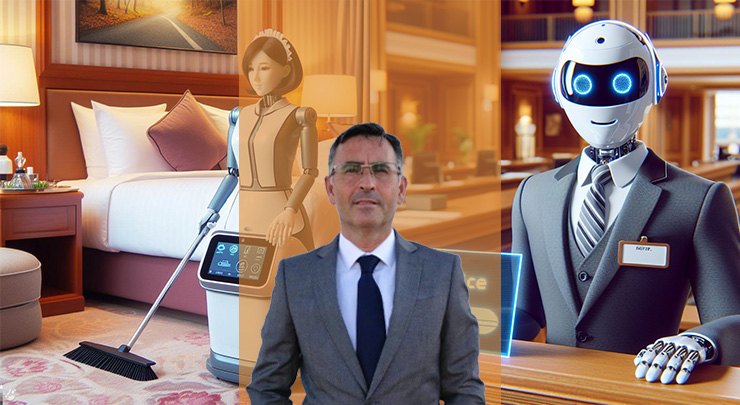Comment
In this technological development, questions arise in the tourism industry: How should we deal with this change? Are our jobs at risk?
In recent months, artificial intelligence (AI) has flooded our lives in surprising ways. Exactly one year ago, ChatGPT appeared, a tool that most of us explored with wonder. Later, Microsoft introduced us to GoPilot, and Google surprised us with Gemini. All of them are joined by a dozen more complementary AIs. In this technological development, the question arises in the tourism sector, especially in hotels: How should we approach this change? Are our jobs at risk? Can AI complement or replace our jobs?
1. Recent years: Adoption of pre-programmed AI
In this first moment of implementation, we see pre-programmed AI in supermarkets, airports and some hotels. We do our own check-in and get basic information Bots predefined. It’s important to note that while this AI we’re used to is very useful, it’s not generative. Does not create new informationIt simply responds to what was previously planned.
2. Current: Creative AI and streamlined tasks
The second moment has already begun, and Generative AI is emerging as an exceptional resource for streamlining internal tasks and communication with customers. In big hotels, it can be used to answer emails or communicate on social networks, which consumes our productive time for humans. We spend a lot of time on social networks, responding to comments or linking our own, uploading photos, and creating information and activity to engage customers with our products and services. This task can easily be delegated to AI as well.
Technology can streamline processes, but human warmth and empathy are irreplaceable in the hospitality industry.”
What a great help in assigning entry rooms! Clients have booked an ocean view room, two beds, quiet, with views of the lighthouse. Also, in CRM, I see what I describe as AI, they’re in room 310, they gave a 10 on the post-test survey, and they mentioned in their comments how they enjoyed the sunset every afternoon. A beer without alcohol. Well, I try to assign them room number 310 or the nearest available room and send an order to the minibars to include 2 non-alcoholic beers along with a handwritten welcome note. And if I see that repeater scoring 7 or less, or any other incident that I don’t know how to manage, I send an alert to management so that a human can manage it.
3. The Future: Integration of Robots with Generative Interactivity
The third moment is when, at a reasonable cost, robots capable of performing everyday tasks can be implemented. Imagine a robot bringing a plate of food to the table and responding to customers’ requests: “Can I bring salt?” Yes sir I will bring it right away. He recognized the customer: Yes, Mr. Vasquez, I’ll bring it to you right away,” replied the customer in the same language he had asked for. Although this scenario is still on the horizon, the future reality that younger generations see as common, for older generations, the desire for human interaction will persist. The robots that appear in the Netflix series will come “Better than us”.
Important Consider the age of our customers: While Millennials can easily accept interactions with AI, Generation Z will find it easier to live with, and Generation Alpha will be the norm, we must emphasize that a large part of the current population prefers humanism: Generation X prefers human therapy, Baby Boomers always prefer to interact with humans, and A peaceful generation needs sympathy and human warmth in a person’s service. These 3 generations represent 40.7% of the population, so we must not forget to focus our services on this large demographic group.
In conclusion, the integration of AI in tourism is inevitable, but the key is to find a balance. Technology can streamline processes, but Human warmth and empathy are irreplaceable in the hospitality industry. In this clash between technology and tradition, the answer lies in finding harmony to offer the best of both worlds.
*Jose Angel Vasquez Romero He is Director of H10 Timanfaya Palace Hotel (Lanzarote), Director of the Tourism Accommodation Section of the College of Professional Tourism and Faculty Member of the MBA Tourism of the Canary Islands Institute of Tourism.
We recommend you
See more

